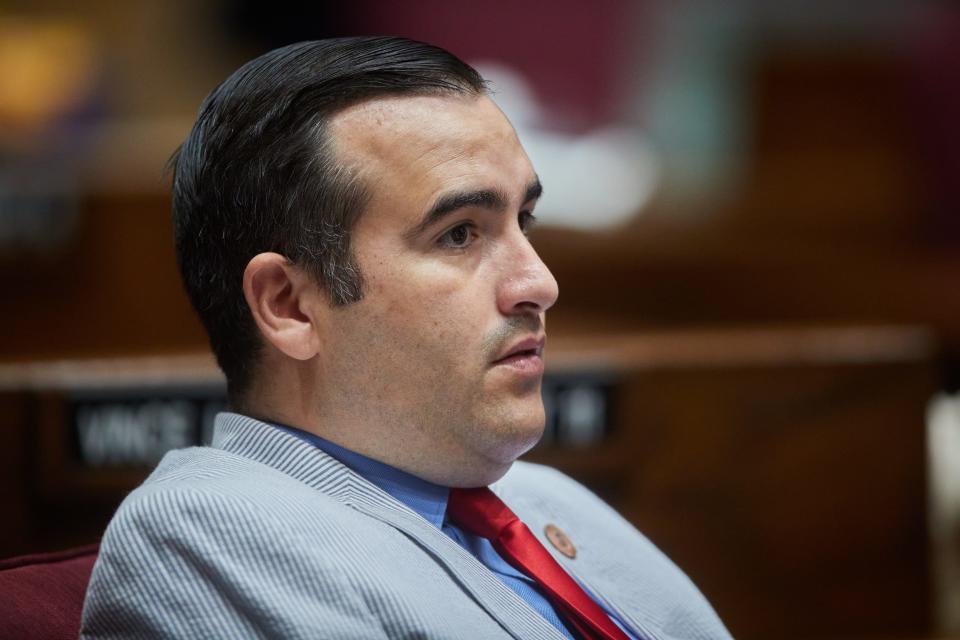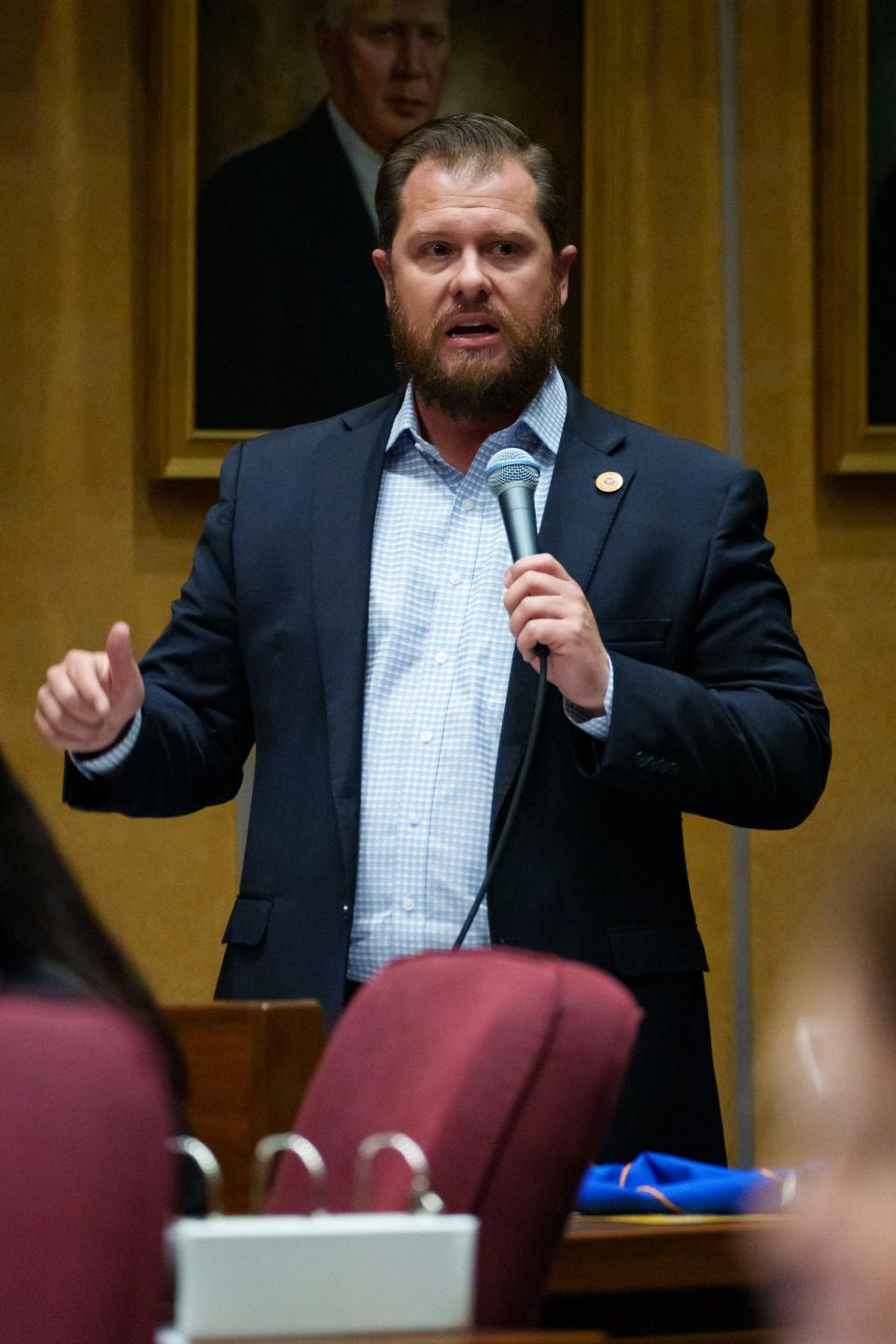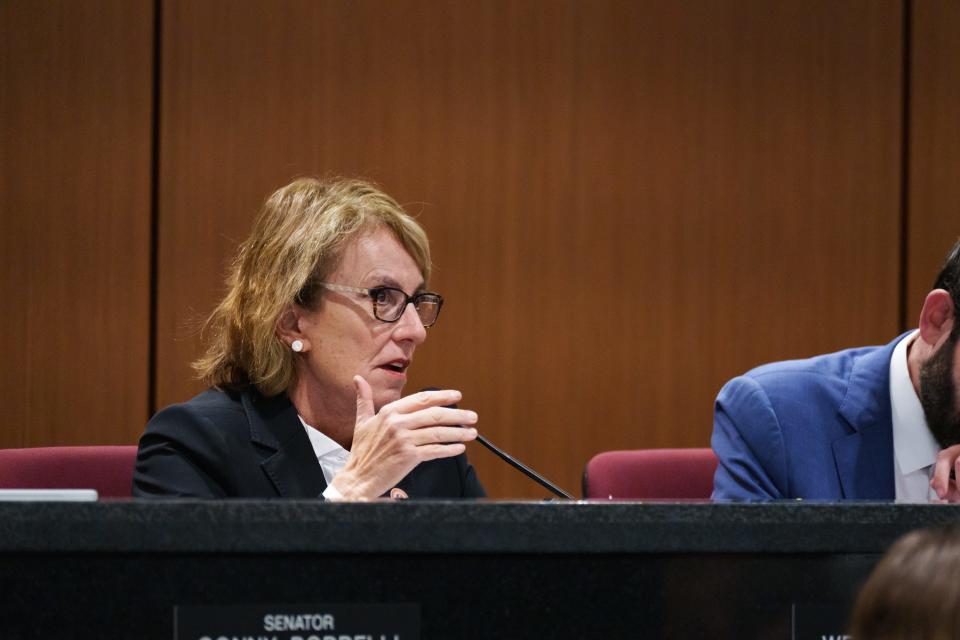Arizona lawmakers pass proposal to shield their addresses from public; Hobbs to decide fate
- Oops!Something went wrong.Please try again later.
Police officers, judges and others in sensitive positions are allowed to strike their names and addresses from the public record. Statewide officeholders, members of the Legislature and election officials in Arizona may soon get added to that list.
Lawmakers expect Senate Bill 1061 to help protect their safety by making it tougher for members of the public to find their homes for any reason — but such a change also would make it more difficult to prove that lawmakers live in their district.
Democrats and nearly all Republicans in the Arizona Senate voted Wednesday to allow the expansion of the identity protection program, which requires applicants for anonymity to get approval from a judge.
The House of Representatives passed the bill with bipartisan support last month, so it's now headed to Gov. Katie Hobbs for a potential signature.

Sen. T.J. Shope, R-Coolidge, credits his wife for asking him to sponsor the bill. Although officeholder addresses have stayed available for decades, the political scene seems to have gotten more dangerous in recent years, Shope said.
"We had our home protested at and others have had similar situations," Shope said, adding that similar protests occurred at the homes of former and current House Speakers Rusty Bowers and Ben Toma, as well as Hobbs.
All Democratic senators and all but three Republican senators, including Sen. Jake Hoffman, R-Queen Creek, voted for the bill.

Hoffman said he supported the bill until an amendment that expanded it to include election officials, which includes employees who receive training and a certificate from the state to work as election officers.
"I've personally received death threats. I know people on both sides of the aisle who have received death threats," Hoffman said. But confidentiality "needs to be reserved for people who need it," he said.
How the identity protection program works
The law already covers peace officers and their spouses, the spouses or minor children of a deceased peace officer, public defenders, prosecutors, code enforcement officers, corrections and detention officers, and support staff for peace and corrections officers. In addition, it covers the victims of domestic violence, stalking and people in address confidentiality programs, such as those in witness protection programs.
The law doesn't provide blanket anonymity for those groups, though. Applicants for the program must explain in an affidavit why they need it and that they believe the program will "serve to reduce the danger." A Superior Court presiding judge must review the affidavit.
Rogers vs. reporter: In recording, Sen. Wendy Rogers pressed judge for further restrictions on reporter
If it's approved, the court orders all information about the person removed from the county recorder's website, or if the danger is deemed immediate, from recorder records entirely. The removal lasts for five years. Other laws allow the same process to shield records in county assessors' offices and motor vehicle offices.
A judge may lift the redaction order if the situation changes or for other reasons.
Proposal could block research on lawmakers
One issue with the proposed change to the law is that knowing the address of a lawmaker also gives the public — including the news media and challengers to an incumbent candidate running for the Legislature — the means to know if a lawmaker is living in his or her district as required by the Arizona Constitution.
Although residency requirements have weakened over the years to include merely the "intent" to move to a property lawmakers own in their individual districts, the issue regularly becomes one of public interest.

For instance, state Sen. Wendy Rogers, R-Flagstaff, filed a property deed this year with the Maricopa County Recorders Office stating she is "currently residing" in a Tempe home where she's lived for more than 20 years, even though her address of record for the legislature is a Flagstaff mobile home.
Last month, Arizona Capitol Times reporter Camryn Sanchez used public records to obtain the addresses of Rogers' residences in Tempe and Chandler and rang the doorbell at the homes, seeking to ask Rogers questions. Rogers then got a judge to approve a restraining order preventing Sanchez from going to the homes again. Sanchez and the Arizona Capitol Times are challenging the order in a hearing scheduled for May 10.
Opinion: Sen. Wendy Rogers survives 'abusive media' and lives to raise funds off of it
In another example, now-Sen. Justine Wadsack, R-Tucson, was challenged to prove she lived in the district in which she was elected, which is near — but does not include — her family home in a Democratic stronghold district. A judge agreed that Wadsack could take office after she claimed she lived in a rented room just inside a Republican-leaning legislative district.
As an elected official, Shope said he has a "vested interest" in the ability to challenge a future competitor for his position. And competitors for Shope's office also have an interest in researching him.
Even though the proposed law would not apply to candidates who have never run for office, existing officeholders and new candidates need a way to challenge the residency of those in office. Shope said the state Secretary of State's Office "will lay out a process" for such challengers.
Opinion: Sen. Wendy Rogers pushes bill to give politicians more free speech than you
Paul Smith-Leonard, spokesman for the Secretary of State's Office, said such a process would not occur without legislation, whatever form that takes.
Fontes said in a statement Wednesday that the existing address confidentiality program is on the verge of budget problems that could make it less effective.
Although the program received funds from the federal Victims of Crime Act, that grant funding will drop substantially in the next fiscal year, which begins July 1, according to the statement.
Fontes wants the Legislature to include ongoing funding to the program of $250,000 yearly from the state.
Reach the reporter at rstern@arizonarepublic.com or 480-276-3237. Follow him on Twitter @raystern.
This article originally appeared on Arizona Republic: Arizona Legislature passes bill to expand whose addresses are hidden

